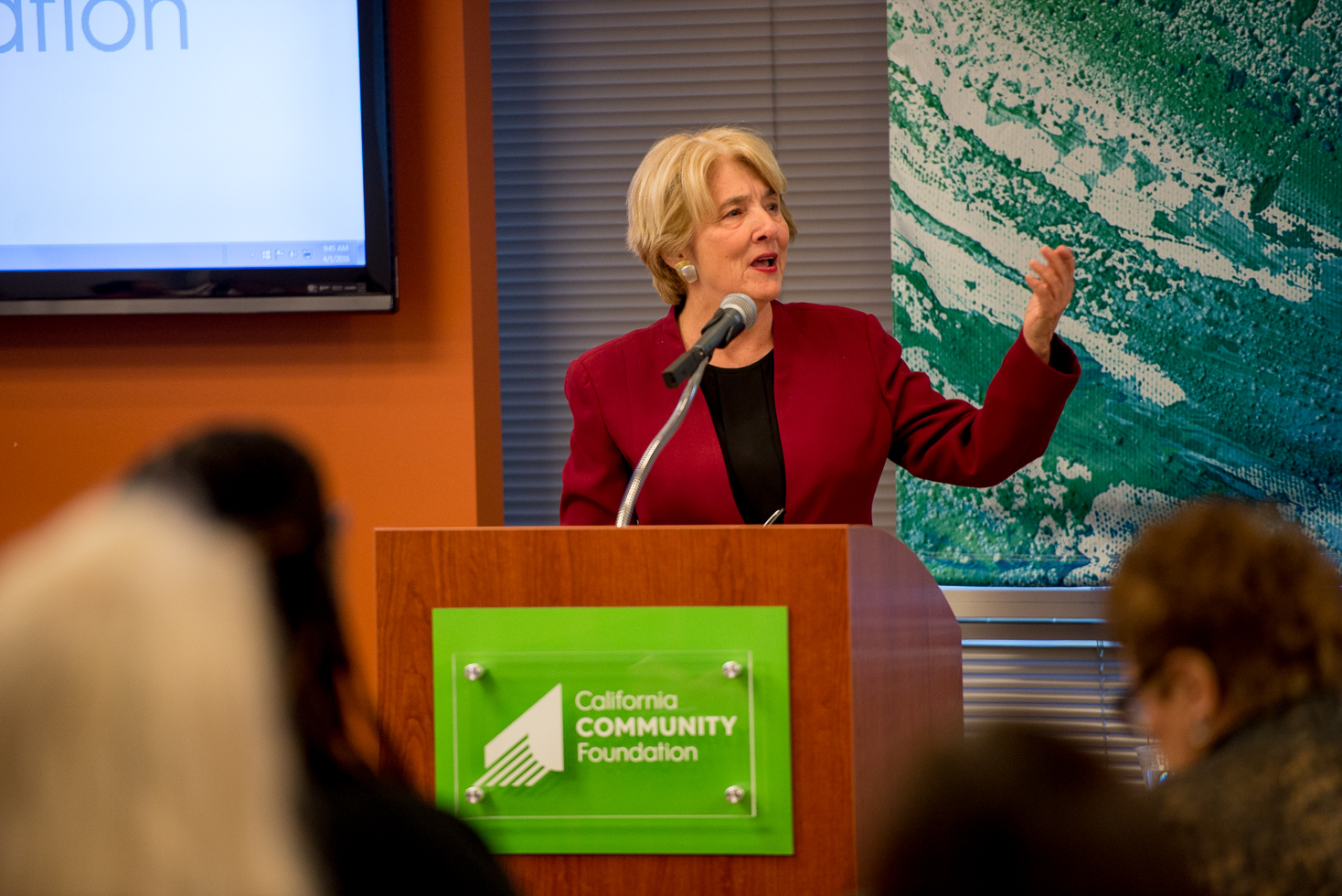Research reveals that exposure to trauma in childhood is associated with many long-term issues into adulthood, including anxiety, depression and PTSD, as well as chronic health conditions such as asthma, heart disease and diabetes.
But there is hope.
Esta Soler, founder and president of Futures Without Violence, shared this with attendees during her keynote address at an April 1 convening, “Healing from Trauma and Building Resilience in Los Angeles: How Systems Leaders Can Make a Difference.”
“CRIME IN ADULTHOOD IS ALMOST ALWAYS (BECAUSE) IT BEGAN IN CHILDHOOD”
The California Community Foundation, First 5 LA, The California Endowment and The Ralph M. Parsons Foundation sponsored a convening of leaders from county departments, philanthropic foundations and community organizations to discuss and learn how Los Angeles County could become a model for identifying and addressing trauma in children and families in a systematic way. The event was held at the California Community Foundation in Los Angeles.
Violence, abuse, neglect and loss impact individuals and communities in the long term – which is why Soler invited attendees to help raise national awareness about childhood trauma, considered by many to be the No. 1 public health problem in America today.
Soler likened trauma to a scratch in a record that sends the needle back to the deepest groove repeatedly; when a former trauma or adverse childhood experience (ACE) is triggered by a current event, the individual may revert back to the same high stress reaction repeatedly.
However, Soler pointed out, “Childhood trauma is not destiny. There are things we can do to tip the scales. That is what this morning is all about.”
Among those in attendance from First 5 LA were Commissioners Judy Abdo and Deanne Tilton Durfee and Executive Director Kim Belshé.

Belshé noted that the agency’s new 2015-2020 Strategic Plan addresses trauma-informed care: “We were compelled by the data on adverse childhood experiences.”
Attendees also heard from experts working in San Francisco and San Diego.
Ken Epstein, Director of the Child, Youth & Family System of Care in Behavioral Health Services for the San Francisco Department of Public Health, said he supported L.A.’s efforts.
“We all know that what goes on in Los Angeles goes on in California,” Epstein said. “So we’re rooting for you… We’re usually competing with you, but we’re rooting for you.”
Among the steps taken in San Francisco to become a trauma-informed city and county was the creation of a mandatory curriculum for employees. In training, an electrician, doctor and accountant were seated together, learning to recognize and respond to trauma.

Charles Wilson is the senior director of the Chadwick Center for Children and Families in San Diego and serves as the Sam and Rose Stein Endowed Chair in Child Protection at Rady Children’s Hospital-San Diego.
He encouraged participants to find and work with existing trauma informed systems. While L.A. County is a huge and complex community, there are many assets to work with, Wilson said.
One such asset is the entertainment industry. The 1984 movie, “Something About Amelia,” made it less taboo to talk about child sexual abuse, he said.
“This is a profound realignment about how we think about the human condition and what we do about it” Mark Cloutier
Panelist Mark Cloutier, executive director of the Center for Youth Wellness in San Francisco, asked the audience to think differently.

“It’s a movement,” Cloutier said. “There’s a deeper message. This is a profound realignment about how we think about the human condition and what we do about it.”
Wendy Garen, president and CEO of The Ralph M. Parsons Foundation, noted the energy in the room in her closing remarks and said “we are setting aside our groove of how we do things – we are only going to do this together.”
Belshé agreed: “I think today was a terrific first step in what is going to be an ongoing process of learning, planning and action. I am pleased to see how many partners we have in this effort to benefit young children and their families.”
Belshé and Garen encouraged participants to participate in the next steps of this effort, including an environmental scan of trauma-informed practices and opportunities in L.A. County and a facilitated planning process that will bring together multiple stakeholders from across county systems to develop concrete actions to move towards a trauma-informed L.A. County.








